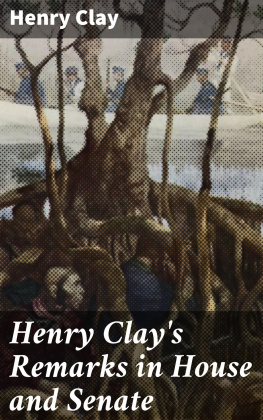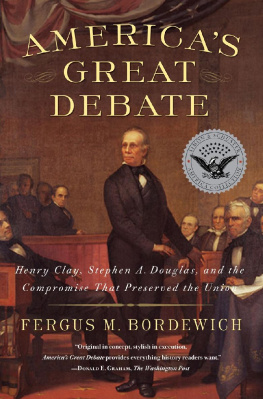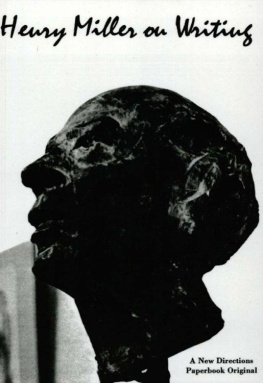Henry Clay, "On the Seminole War,"
U.S. House of Representatives
19 January 1819.
Henry Clay, "On the Expunging Resolutions,"
U.S. Senate
16 January 1837
Part 1
Henry Clay, "On the Expunging Resolutions,"
U.S. Senate,
16 January 1837
Mr. President:
WHAT patriotic purpose is to be accomplished by this Expunging resolution? What new honor or fresh laurels will it win for our common country? Is the power of the Senate so vast that it ought to be circumscribed, and that of the President so restricted that it ought to be extended? What power has the Senate? None, separately. It can only act jointly with the other House, or jointly with the Executive. And although the theory of the Constitution supposes, when consulted by him, it may freely give an affirmative or negative response, according to the practice, as it now exists, it has lost the faculty of pronouncing the negative monosyllable. When the Senate expresses its deliberate judgment, in the form of resolution, that resolution has no compulsory force, but appeals only to the dispassionate intelligence, the calm reason, and the sober judgment, of the community. The Senate has no army, no navy, no patronage, no lucrative offices, no glittering honors, to bestow. Around us there is no swarm of greedy expectants, rendering us homage, anticipating our wishes, and ready to execute our commands.
How is it with the President? Is he powerless? He is felt from one extremity to the other of this vast Republic. By means of principles which he has introduced, and innovations which he has made in our institutions, alas! but too much countenanced by Congress and a confiding people, he exercises, uncontrolled, the power of the State. In one hand he holds the purse, and in the other brandishes the sword of the country. Myriads of dependants and partisans, scattered over the land, are ever ready to sing hosannas to him, and to laud to the skies whatever he does. He has swept over the government, during the last eight years, like a tropical tornado. Every department exhibits traces of the ravages of the storm. Take as one example the Bank of the United States. No institution could have been more popular with the people, with Congress, and with State Legislatures. None ever better fulfilled the great purposes of its establishment. But it unfortunately incurred the displeasure of the President; he spoke, and the bank lies prostrate. And those who were loudest in its praise are now loudest in its condemnation. What object of his ambition is unsatisfied? When disabled from age any longer to hold the sceptre of power, he designates his successor, and transmits it to his favorite! What more does he want? Must we blot, deface, and mutilate the records of the country, to punish the presumptuousness of expressing an opinion contrary to his own? What patriotic purpose is to be accomplished by this Expunging resolution? Can you make that not to be which has been? Can you eradicate from memory and from history the fact that in March, 1834, a majority of the Senate of the United States passed the resolution which excites your enmity? Is it your vain and wicked object to arrogate to yourselves that power of annihilating the past which has been denied to Omnipotence itself? Do you intend to thrust your hands into our hearts, and to pluck out the deeply rooted convictions which are there? Or is it your design merely to stigmatize us? You cannot stigmatize us.
"Ne'er yet did base dishonor blur our name."
Standing securely upon our conscious rectitude, and bearing aloft the shield of the Constitution of our country, your puny efforts are impotent; and we defy all your power. Put the majority of 1834 in one scale, and that by which this Expunging resolution is to be carried in the other, and let truth and justice, in heaven above and on earth below, and liberty and patriotism, decide the preponderance.
What patriotic purpose is to be accomplished by the Expunging resolution? Is it to appease the wrath and to heal the wounded pride of the Chief Magistrate? If he be really the hero that his friends represent him, he must despise all mean condescension, all grovelling sycophancy, all self-degradation and self-abasement. He would reject, with scorn and contempt, as unworthy of his fame, your black scratches and your baby lines in the fair records of his country. Black lines! Black lines! Sir, I hope the Secretary of the Senate will preserve the pen with which he may inscribe them, and present it to that Senator of the majority whom he may select, as a proud trophy, to be transmitted to his descendants. And hereafter, when we shall lose the forms of our free institutions, all that now remain to us, some future American monarch, in gratitude to those by whose means he has been enabled, upon the ruins of civil liberty, to erect a throne, and to commemorate especially this Expunging resolution, may institute a new order of knighthood, and confer on it the appropriate name of "the Knights of the Black Lines."
But why should I detain the Senate, or needlessly waste my breath in fruitless exertions? The decree has gone forth. It is one of urgency, too. The deed is to be donethat foul deed which, like the blood, staining the hands of the guilty Macbeth, all ocean's waters will never wash out. Proceed, then, to the noble work which lies before you, and, like other skilful executioners, do it quickly. And when you have perpetrated it, go home to the people, and tell them what glorious honors you have achieved for our common country. Tell them that you have extinguished one of the brightest and purest lights that ever burned at the altar of civil liberty. Tell them that you have silenced one of the noblest batteries that ever thundered in defence of the Constitution, and bravely spiked the cannon. Tell them that, henceforward, no matter what daring or outrageous act any president may perform, you have forever hermetically sealed the mouth of the Senate. Tell them that he may fearlessly assume what powers he pleases, snatch from its lawful custody the public purse, command a military detachment to enter the halls of the Capitol, overawe Congress, trample down the Constitution, and raze every bulwark of freedom; but that the Senate must stand mute, in silent submission, and not dare to raise its opposing voice. Tell them that it must wait until a House of Representatives, humbled and subdued like itself, and a majority of it composed of the partisans of the President, shall prefer articles of impeachment. Tell them, finally, that you have restored the glorious doctrine of passive obedience and non-resistance. And, if the people do not pour out their indignation and imprecations, I have yet to learn the character of American freemen.
* * * * *
Part 2
Henry Clay, "On the Seminole War,"
U.S. House of Representatives,
19 January 1819.
IF MY recollection does not deceive me, Bonaparte had passed the Rhine and the Alps, had conquered Italy, the Netherlands, Holland, Hanover, Lubec, and Hamburg, and extended his empire as far as Altona, on the side of Denmark. A few days' march would have carried him through Holstein, over the two Belts, through Funen, and into the island of Zealand. What, then, was the conduct of England? It was my lot to fall into conversation with an intelligent Englishman on this subject. "We knew (said he) that we were fighting for our existence. It was absolutely necessary that we should preserve the command of the seas. If the fleet of Denmark fell into the enemy's hands, combined with his other fleets, that command might be rendered doubtful. Denmark had only a nominal independence. She was, in truth, subject to his sway. We said to her, Give us your fleet; it will otherwise be taken possession of by your secret and our open enemy. We will preserve it and restore it to you whenever the danger shall be over. Denmark refused. Copenhagen was bombarded, and gallantly defended, but the fleet was seized." Everywhere the conduct of England was censured; and the name even of the negotiator who was employed by her, who was subsequently the minister near this government, was scarcely ever pronounced here without coupling with it an epithet indicating his participation in the disgraceful transaction. And yet we are going to sanction acts of violence, committed by ourselves, which but too much resemble it! What an important difference, too, between the relative condition of England and of this country! She, perhaps, was struggling for her existence. She was combating, single-handed, the most enormous military power that the world has ever known. With whom were we contending? With a few half-starved, half-clothed, wretched Indians and fugitive slaves. And while carrying on this inglorious war, inglorious as regards the laurels or renown won in it, we violate neutral rights, which the government had solemnly pledged itself to respect, upon the principle of convenience, or upon the light presumption that, by possibility, a post might be taken by this miserable combination of Indians and slaves.








